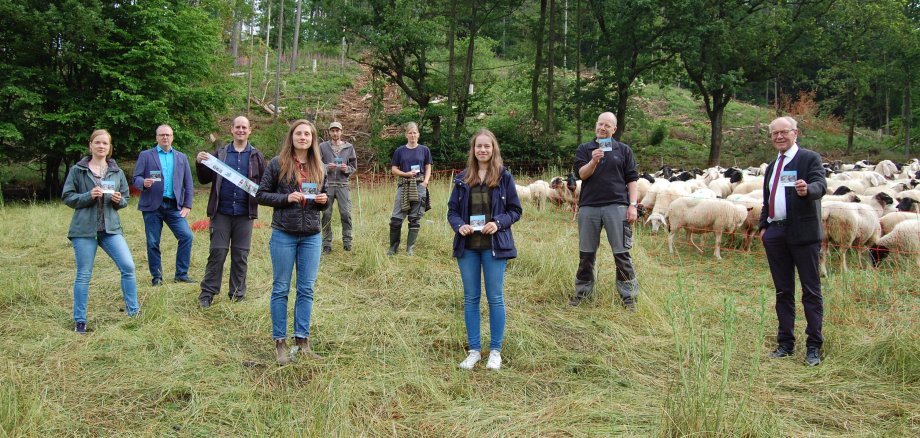Support and value regional sheep farming
The district of Waldeck-Frankenberg is considered one of the districts in Hessen with the most sheep. Around 10,000 sheep are kept in approx. 450 flocks. However, sheep farming has been declining for years, although it is very important for nature conservation and landscape management. The eco-model region and the landscape conservation association have now produced a "sheep flyer" in cooperation with a sheep farmer to draw attention to the importance of the woolly four-legged friends for our environment. District Administrator Dr. Reinhard Kubat on behalf of the eco-model region and Bad Wildungen's Mayor Ralf Gutheil as Chairman of the Landscape Management Association (LPV) agree: "Sheep farming is of great importance for our environment, so cooperation to support sheep farmers is highly sensible and desirable".
Sheep are true all-rounders: irreplaceable in landscape management, they contribute to nature and species conservation, provide high-quality regional products such as milk, wool or meat and promote tourism. Our meadows and pastures have been shaped predominantly by grazing, which has also given rise to species-rich and nutrient-poor areas such as heaths - valuable for nature conservation and species protection. To prevent them from becoming overgrown, sheep grazing is a good way of maintaining the areas. Sheep also go where machines cannot be used. Due to their tasteful preferences, they create colourful and varied habitats for a wide range of animal and plant species. The attractiveness of the landscape is increased and thus tourism is also promoted.
Unfortunately, sheep farming is associated with a number of problems nowadays: low interest in sheep products (milk, wool, meat), resulting in a lack of income that cannot be compensated by paid landscape management measures. Co-operations with other farmers for grazing the inter-growth or the pre-grazing (short-term grazing of an area in spring) also take place only to a small extent or not at all. And last but not least, sheep farmers are faced with further difficulties due to the reintroduction of the wolf, even to the point of considering giving up sheep farming.
The Ökomodellregion and the Landschaftspflegeverband have made it their task to draw attention to the necessity of keeping sheep. In the project "Sheep - nature's all-rounder", the eco-model region wants to network sheep farmers with each other and thus support them. This is also a special concern of the landscape conservation association, as landscape conservation is not possible without grazing.
With the "sheep flyer", Dr Kubat and Gutheil are now calling on people to "support sheep farmers by buying regional sheep products". The flyer, which is available for download on the websites of the landscape conservation association www.lpv-wa-fkb.de and the eco-model region www.oekomodellregionen-hessen.de/region/landkreis-waldeck-frankenberg, lists where the products can be found. Print copies are available by phone 05631 954-565 or by e-mail info@lpv-wa-fkb.de.
